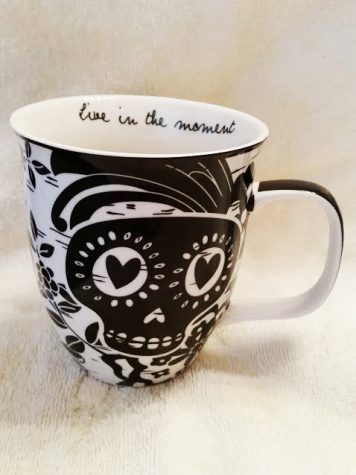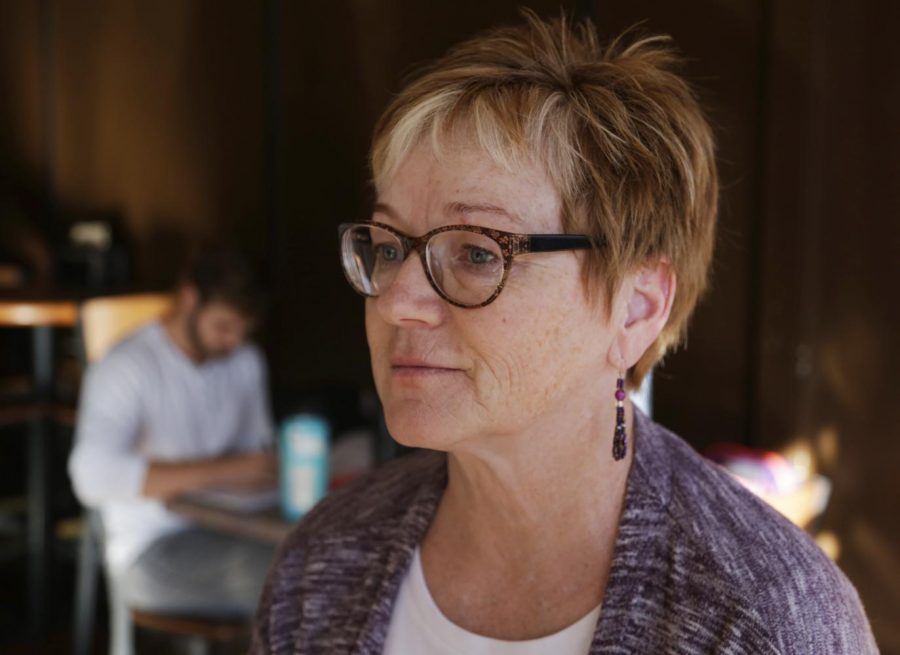Gain comfort while sharing experiences
Death Cafe encourages healthy discussion on the topic of death
RYAN PUGH | the Daily Evergreen
Terrie Teare, Friends of Hospice program coordinator, talks about the Death Cafe and how it came to Whitman County. This week’s Death Cafe will be the third time Friends of Hospice has hosted the event.
October 18, 2017
Friends of Hospice will host a session for community members to express their ideas surrounding death.
The international organization Death Cafe was founded in 2010 by Jon Underwood, who decided to develop a project focused on discussing death. The first Death Cafe was held in September 2011 at Underwood’s residence in East London, according to their website.
Terrie Teare, Friends of Hospice program coordinator, said the Friends of Hospice first heard about Death Cafe online. When she looked into it further, the nearest one was in Portland, and after attending a Death Cafe there, they decided to bring one to Whitman County. This is the third one they’ve hosted.
“[Underwood] thought people don’t talk about death enough, and so they aren’t comfortable with it,” Teare said. “He thought if people drink tea and eat cake, it would lessen the awkwardness of it.”
A Death Cafe represents a safe place for people to discuss their thoughts, ideas and experiences surrounding death, Teare said. Participants can talk about what they learned from witnessing death in their own lives, shed a few tears and even share a laugh.
As Friends of Hospice guidelines online state, they have no agenda, no set program to follow, and don’t push anyone to reach a particular conclusion about death.
“I look forward to people connecting with each other,” Teare said. “There are people of all different backgrounds who come, and death is common to all of them.”
The area doesn’t have readily available spaces to discuss death, Teare said. In the Friends of Hospice’s work with those who are dying, they find many people experience discomfort talking about death. By talking about it before a crisis occurs, they may have an easier time dealing with it.

Discussing death before it occurs can ease the experience when it does.
If the talk quiets down for any reason, they will ask a thought-provoking question to re-engage participants, such as describing the most impactful death they’ve experienced. But generally, Teare said, it never takes much to get people to talk about important aspects of their lives.
Everybody who comes will have support whether they want to participate or just listen, Teare said. If anyone doesn’t feel comfortable talking in this upcoming session, the Friends of Hospice will host more in the future.
Executive Director Annie Pillers said a Death Cafe finds commonalities in our culture regarding death. Without any sort of political ideology, it creates a respectable way to open up the conversation and bring people together.
Similar organizations, such as Death Over Dinner, serve the same purpose, Pillers said. The idea of pairing difficult conversation with food can make that conversation a little easier.
“We used to be born, raised and die in our homes and used to talk about death at our kitchen table,” Pillers said, “because it was a normal topic.”
All community members and students are welcome to come to this Death Cafe, she said. Guests might sit at a table with six or seven people with a facilitator and share their own personal story or share ways they have honored their loved ones.
The next Death Cafe will take place at 2 p.m. Saturday in the Friends of Hospice office. Coffee, tea and food will be provided. These conversations are completely confidential, and they ask that participants respect the privacy of others. Admission is free.









